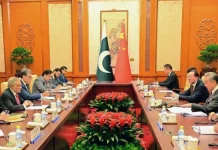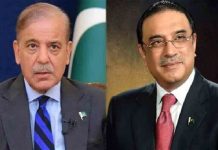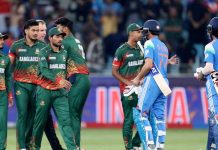———– Multi-party moot concludes with a unanimous resolution calling for immediate cessation of Israeli hostilities
———– Calls for end to Israeli atrocities in Gaza on war footing
———– Hopes for peace and stability to prevail instead of chaos and destruction
———– President vows to continue raising Tel Aviv’s human rights violations at every forum
By Anzal Amin
ISLAMABAD: Pakistan’s political leadership, convened at the President’s House on Monday for an All-Parties Con-ference (APC), has called for a unified platform of Islamic countries to confront Israel’s ongoing aggres-sion against Palestinians. The participants emphasised the need for decisive action by the international Muslim community.
The APC, held on the invitation of Prime Minister Shehbaz Sharif, centred around the recent escalation in the Middle East, particularly the situation in Palestine. Prominent political figures, including Presi-dent Asif Ali Zardari, former prime minister Nawaz Sharif, JUI-F chief Maulana Fazlur Rehman, and PPP Chairman Bilawal Bhutto-Zardari, were in attendance.
The conference began with a recitation from the Holy Quran, followed by Pakistan’s national anthem. Federal Minister for Climate Change, Sherry Rehman, presented the agenda, noting that the meeting was being held to address the attacks Israel initiated against Palestinians on October 7, marking a grim anniversary.
President Asif Ali Zardari, delivering the opening speech, condemned Israel’s actions as “genocidal.” He stated that the world community has failed to intervene effectively to stop Israel’s continuous assaults on Palestinians.
“Israel has martyred over 41,000 Palestinians in the latest round of aggression, and now it is targeting Lebanon and Syria as well. The international community is unable to stop these atrocities. This is a seri-ous threat to regional peace,” Zardari said.
Recalling Pakistan’s historic ties with the Palestinian Liberation Organisation (PLO), he added: “We have cooperated with the PLO for decades. I met Yasser Arafat many times, and Pakistan has always stood with Palestine. We saw PLO offices here in Pakistan, but now Israel is increasing its violent operations.”
Zardari urged Muslim countries to use their collective power to halt Israel’s advances. “The Islamic world has enormous strength. If we do not use it now, then when?” he asked.
Former prime minister and PML-N leader, Nawaz Sharif, expressed disappointment over the United Nations’ inability to implement its resolutions on Palestine, likening the situation to the Kashmir con-flict.
“The world is witnessing the worst atrocities in history. Entire cities in Palestine have been turned into rubble. Children are being snatched from their mothers and killed in front of their parents. And yet, the world remains silent,” Sharif said.
He added: “The UN is helpless in enforcing its own resolutions, just like it has been on Kashmir. What good is an organisation that cannot ensure justice for oppressed people?”
Nawaz also suggested that the collective military strength of Islamic countries be mobilised against Is-rael. “Islamic nations have a massive military alliance. If they do not act now, when will they? This is the moment to stand together and create a policy to protect Muslims from further bloodshed.”
Sharif emphasised the need for immediate action and urged the Pakistani leadership to quickly draft recommendations and seek collaboration from Muslim nations globally. “This must happen without delay,” he stressed.
JUI-F chief Maulana Fazlur Rehman echoed Nawaz Sharif’s concerns, referring to Israel’s foundation as a colonial project dating back to the 1917 Balfour Declaration by Britain. He also reminded the gathering of Pakistan’s founder, Quaid-e-Azam Muhammad Ali Jinnah, who had denounced Israel as an “illegiti-mate child.”
“It is astonishing that some people in Pakistan have even suggested recognising Israel,” Rehman said, rejecting any possibility of a two-state solution. He condemned the recent Israeli aggression, which has now expanded beyond Palestine to Lebanon and other neighbouring countries.
Rehman criticised the global response to the Israeli-Palestinian conflict, stating that even smaller na-tions like South Africa had taken stronger action by bringing the issue before the International Court of Justice. He urged the government to form a coalition of major Muslim countries to tackle Israeli ag-gression collectively.
“Why are we not supporting Hamas openly?” Rehman asked, referring to the Palestinian resistance group. “To the West, they may be terrorists, but to us, they are freedom fighters. It is time we declare our support openly.”




